Organic way to get rid of Bermuda grass
Probably a hopeless cause, but is there any way to get rid of bermuda grass? We are trying to redo our back yard. It is currently full of rocks, concrete, rebar, and hard pack clay, all being slowly taken over by the bermuda grass my neighbor planted. Our plan is to till, rake, amend with topsoil and compost, however, I know if we till the bermuda grass into the soil, it will just keep growing. Any suggestions?
Thanks,
Kathy
Comments (156)
Debra Vessels
9 years agolast modified: 9 years agoWOW, I read this thread because I put raised beds in an area that had bermuda, after digging it out, but I am still pulling bermuda out of them after 4 years. I was hoping there was an organic answer, because, I don't use chemicals for my raised bed, Bird, Bee and Butterfly Garden.
Evidently Not....JoppaRich
9 years agolast modified: 9 years ago"Round Up and the other glyphosate products should not be brought up and discussed, much less advocated, in an organic gardening forum."
Gardenweb is for the dissemination of information, Not for pushing an agenda of ignorance.
If roundup is the least hazardous, most effective solution, it's what he should be using. Vinegar is a waste of time, effort, and money, and does way more damage than roundup does.
Related Professionals
Bellflower Landscape Architects & Landscape Designers · Hershey Landscape Architects & Landscape Designers · Lyons Landscape Architects & Landscape Designers · Mitchellville Landscape Architects & Landscape Designers · Owings Mills Landscape Architects & Landscape Designers · Cicero Landscape Contractors · Pompton Lakes Landscape Contractors · Goldenrod Landscape Contractors · Grandview Decks, Patios & Outdoor Enclosures · Hot Springs Village Decks, Patios & Outdoor Enclosures · Montgomery County Decks, Patios & Outdoor Enclosures · Myrtle Beach Decks, Patios & Outdoor Enclosures · Wildomar Decks, Patios & Outdoor Enclosures · Jericho Stone, Pavers & Concrete · Laguna Beach Stone, Pavers & ConcreteFrancoiseFromAix
9 years agolast modified: 9 years agoDebra, I'm luckier than you, I read this thread before starting a useless war against bermuda grass, hence saved time ;-)
Now I just feel sorry for the plants in my garden who don't like growing among BG !
yatehe
9 years agolast modified: 9 years agoHas anyone seen if goats + chickens that scratch up ground
will work ? on old 1800 pics. settlers will have a dirt yard & chickens in the front .
?????lazy_gardens
9 years agolast modified: 9 years agoHas anyone seen if goats + chickens that scratch up ground will work?
Only on the above-ground parts, and they nibble them to nubs, not dig them out. As soon as there is water, it sprouts again.
HERE'S THE DEAL WITH BERMUDA GRASS FOLKS: It's an African grass that comes from an area with crappy soil and months-long dry seasons. It is regularly eaten to the bare dirt and stomped on by migrating swarms of wildebeest and gnus and locusts and regrows with the next rainstorm. It can regenerate from any fragment of underground rhizome that has a "node".
You are trying to kill it with diluted organic apple cider vinegar? Hand-pulling? That's like using a pea-shooter on an elephant.
You have to use something that can kill the deep roots and the underground rhizomes or it WILL come back like Freddy Kruger. The clear advantage of glyphosate is that it kills from the roots upwards by messing up the metabolism of the plant ... it is moved from the leaves to the roots by translocation, and kills the roots and rhizomes. Eventually. Even glyphosate usually needs a series of applications a couple of weeks apart.
Used meticulously, and used in a way that takes advantage of translocation in vigorously growing plants, glyphosate will kill Bermuda grass with no collateral damage. (Basically, get the grass growing well, then spray, then mow short a few days later. If you withold water, mow and pull and till and try to use glyphosate to "kill what's left" it will fail.)
For sprig-killing, look up The "tongs of Death" or the "Tongs of Doom"
ernie85017, zn 9, phx
9 years agolast modified: 9 years agoDeath to bermuda grass.
I fight a never-ending war.
slowjane CA/ Sunset 21
9 years agolast modified: 9 years agoJust thought I'd add my 2 cents to the archive here...
I managed to pull the BG from our front yard last summer - only maybe 250 sq ft, so I could do it myself - took maybe 3 short days on hands and knees - using a garden weasel to loosen it and break it up, or hand fork with a big chopping motion if the ground was too solid - I sifted out the stolons and rhizomes carefully, and as best as I could - they were mostly in the top 4 inches or so and are connected underground like the stolons above ground.
I then solarized it (after loads of research about that process) using clear plastic (which heats up more than black and recommended for our climate/season) for 6 weeks. However, I started this in August so only a few weeks of that was really hot - and the second part of it basically just brought up the other weeds because the area received much less sun as the days shortened. But that was also beneficial.
I find a bit here and there coming up from a rhizome which are very easy to pull because they're orphaned underground, cut off from the network. I now have it planted with native CA plants, and mulched with free city mulch.
Bermuda is bad. But I have quite a few other things on my list that drive me nuts too. ;) I pulled up a stinging nettle with my bare hand the other day not knowing any better and that made an impression, for sure.
Anyway, that is my story in case it's useful. I don't think roundup is inevitable, nor do I think you have to accept bermuda if you don't want to and are willing to do the labor or hire other people to do the labor of removal.
pontyrogof
9 years agolast modified: 9 years agoThanks slowjane,
I don't think RU is inevitable either. I got rid of all my front and back yard BG in Lexington KY by saturating it with water, about a dozen square feet at a time, and digging it up with a potato fork. I piled up the big hanks of sod on my driveway and let it desiccate in the sun. I immediately covered the bare dirt with a foot deep of wood chips. The big hanks of dried sod had too much dirt on them to go in the yard waste bin, so I piled them up, root side up, in a back corner. After a year they never did come back to life.
The most important phase of this process is saturating the patch before digging it up. Then the only problem is the pieces of sod are heavy with water, but if you chop them up a bit before piling them in the wheel barrow, they are manageable.
(Here in North FL it seems that my soil is too pine straw rich for BG. But the poison ivy grows like English. :) I think I'll try horticultural lime after my lizards and snakes are asleep for the winter.)
butchfomby
9 years agolast modified: 9 years agoONE YEAR I USED HOUSE SHINGLES UNDER CHAIN LINK FENCE TO CONTROL BERMUDA GRASS...JUST LAP 3 OR 4 INCHES....MAKES WEED EATING SO MUCH EASIER AND YOU CAN HARDLY SEE BROWN SHINGLES...DON'T KNOW ABOUT LARGE AREA....SOME SMART GARDNER WILL FIGURE A WAY TO ROT THE GRASS (KILL IT)....I MAY TRY TWO WAYS...SOAK THE AREA GOOD AND THEN COVER WITH BLACK PLASTIC...ALSO H GARRETT SAYS TO COVER WITH HALF INCH OF COMPOST AND THEN THICK LAYERS OF CARDBOARD AND WET IT DOWN GOOD, I GUESS KEEP IT WET....CAUSES GRASS TO ROT (KILLS IT)...ROOTS AND ALL...WE'LL SEE....THE INDIAN
butchfomby
9 years agolast modified: 9 years agoBERMUDA GRASS NEEDS SUNLIGHT TO LIVE....GREEN ON TOP OF GROUND FEEDS ROOTS....KEEP THE GREEN KILLED LONG ENOUGH AND ROOTS WILL DIE...GOING TO TRY TO KEEP GRASS BURNED OFF, EVERY WEEK OR SO, CUTTING OFF FOOD TO ROOTS....WILL USE PROPANE BURNER TORCH TO TRY THIS WAY (SUMMERTIME)....NO GREEN, NO FEED WAY...JUST RAMBLING...EXPENSIVE BUT ONE WAY TO DEFEAT BERMUDA IS SIT CONTAINERS ON TOP OF IT AND GROW YOUR CROPS, KEEP GRASS MOWED....SEEMS LIKE ONE BARRIER I SEE IS A 3 OR 4 FT WIDE BED OF FLAGS OR IRISES, THEY ARE PRETTY TOO...THE INDIAN
ArtSandroG
9 years agolast modified: 9 years agoHow to Successfully Kill Bermuda Grass...The Cheap way!
I have been combating Bermuda Grass in my San Diego Garden for 6 years.
I have tried many techniques, but there really is only 1 guaranteed method for Bermuda Grass removal.List of Tools you will need:
- Large pickax
- Gloves
- Strong Back
- Time
- Water
- RakePick a small spot on the yard, and start digging a hole, about 3 inches deep
(In my case, the Bermuda rhizomes/roots grow 12 inches deep)
Fill the new hole with water, and wait for the water to drain into the dirt. (This will soften the dirt, making it easier to dig deeper and deeper)Then just keep digging, until you get all the roots out.
Yes, its back braking work
Yes, it takes a long timeBut its cheap, and good exercise, and chemical free.
The trick is to focus on underground roots.
Once the dirt is soft, and the roots are chopped up, you can rake the Bermuda roots away, and let them bake in the sun, or just pick them up and throw them away.Happy Digging!!
Sandro G
josephene_gw
9 years agolast modified: 9 years agoBermuda grass roots can grow 6 ft down.
Didn't see anyone using several thickness of landscape
Fabric and mulch, cedar if you can get it.slowjane CA/ Sunset 21
9 years agolast modified: 9 years agoThat's a common misconception about the depth of the roots - the water seeking roots may go that far - but not the *rhizomes*, which is what resprouts. Those are only about 6 inches down, like Sandro said. They run laterally like the stolons above ground. It is absolutely possible to dig them out. I did last year (granted on a small yard) by myself with a small pickaxe and have had almost no regrowth. The bits that do come up aren't attached to larger systems so are easy to pull. I agree with Sandro - worked for me.
slowjane CA/ Sunset 21
9 years agolast modified: 9 years agoThe roots might - but not the rhizomes. Roots don't regenerate - rhizomes do. If you can pull all of those, you will get rid of it - even if you don't pull all the roots. It's easy to tell the difference. Rhizomes are much bigger and attached differently.
Also I would think that the roots would go as deep here in Southern California - since we get so little rain. Natives have root systems up to 30 feet deep.
Re: rhizomes vs. roots - See the link below.
fireweed22
9 years agolast modified: 9 years agoEven here, roundup is recommended.
How about light exclusion? No matter what you do weeds can reseed or re spread from surrounding areas back into the controlled area. But walking around with glyphosate in a sprayer is not the answer people are seeking in an ORGANIC forum. Moderators???
apreyes12
9 years ago9 years of posts and 90 minutes of reading later...I'm convinced that we are fighting a monster! I'm in drought stricken central TX and if we want any semblance of a lawn in any sunny area, then we need bermuda. Vegetable gardening is my concern. My thought is to place 11" raised beds for vegetable gardening over the bermuda with a 1/2- 1" layer of newspaper and cardboard. The NP/CB layer would be covered with 11" of veggie soil compost. May be a dumb question, but would the NP/CB layer coupled with the 11" of soil compost be enough to "drown out" any attempt from the bermuda to push through to the top of the raised bed veggie soil? Any successes or thoughts?
zeuspaul
9 years agoThat sounds more like a container than a raised bed. The newspaper layer will also contain the vegetable roots. Eleven inches for the roots in a dry climate doesn't seem like enough.
I would opt for large containers or an elaborate raised bed. For a raised bed you would need a bermuda barrier going down several feet. Two feet might not be enough. The bermuda will find the water from the raised bed and dive deep to get it. Three foot deep barrier might work. Perhaps a vinyl floor mat placed vertically around the perimeter with some way to join the ends.
I don't know how big of a garden you want. You might try a group of 25 gal nursery pots raised off the ground. Bermuda will creep into the drain holes if given a chance.
FrancoiseFromAix
9 years agoapreyes,
"any successes or thoughts ?" I can just tell about my failure, sorry ;-(
Last year, I tried to dig out by hands all bermuda stolons from 2 beds, it took me several week ends. Then I put about one foot of manure and straw, and 2 months later I planted in holes filled with vermicompost. Those 2 beds were the worst invaded ones. The BG stiffled all tomatoes plants, and those were the best plants I had grown from seeds. The zukes did a little better, because they're fast growers and shade the grass. So in August I started piling grass cuttings on top of everything, plants included, and put about a foot of a hot slimy mess. Then I put whole newspapers and straw. At the end of September, those pointy heads of BG were already appearing through everything :-(
I also built 2 or 3 other beds without digging (no time), I just put some manure on top of BG then planted tomatoes and obviously BG grew amongst the toms but was less aggressive than where I had tried to dig it out.
I'm going on experimenting this 2nd year, it's a war with multiple strategies :
Raised mounds, about 2 feet high, built with 2 or 3 layers of card board and newspapers at different levels. They'll be covered with Crimson clover and I'll interplant the veggies in the clover. I started raising them in October, and add stuff on top along the way. I introduced worms in the mounds, hoping they'll eat some of the, I hope, agonizing BG.
On top of the "lawn", a lot of white clover seeds in Automn (15 kg/30 lbs for a 350 m2/3500 square feet) and same again in a few weeks. I hope the clover will stiffle the BG, but that might be just a dream.
Fertilize the "lawn" only till January when BG is dormant to feed all weeds and grass but BG. Though I'm not sure that'll work since organic fertilizers have a long term effect that could benefit BG.
The patches of pure BG has easily seen in winter since they're ugly and brownish, so I buried them in sawdust mixed with bags and bags of decaying pine needles to encourage saprotrophic organisms to feed on the agonizing BG underneath.
I guess I appear as crazy and honest I think somehow I am. I can't help noticing all the BG growing everywhere now when I'm driving around, our roadsides, roundabouts, countryside, everywhere here nowadays is just covered with this brownish grass that you can't help noticing when you've started to fight it in your own garden. Why do some people feel the need to buy seeds of BG is just beyond my understanding !I'll keep posting with my war's results next spring and summer when heat brings the monster back to life.
gardenerbecky
9 years agoHi all,
This has been a fascinating thread, and I thought I'd add my experience. I purchased my one acre property 14 years ago and the was pretty much all Bermuda grass and non-native shrubs. I hate mowing. I'm also too cheap to pay someone to dig out all that Bermuda, and too lazy to do the digging myself. I am patient and persistent though, and this is what worked for me:
I only worked on one small section at a time. I mowed the grass short in the area I wanted to work on, spread 2 layers of wet cardboard down, then covered the cardboard with large piles of horse manure. (I have two horses who were happy to provide the manure.) As others have mentioned, the Bermuda will come up through the manure, BUT it is super easy to pull at that point. It just comes up in long strings. I would hand pull it, or use one of those garden forks to lift it out. I think the key is to have such a thick layer of manure that by the time the grass leaves get to the surface, you are pulling out most of the attached rhizomes. The cardboard slows the grass down too, so I can keep up with it.
It took a long time to get rid of it all, but I was spending about the same amount of time on each section each week that it would take to mow that section anyway. I'd start a new section when I wasn't spending too much time keeping the previous section Bermuda-free. I was also planting natives in the former lawn while the process continued.
Now, it doesn't come back anymore. It's gone. It was easy work compared to all the digging I'm hearing about, and I think the process looks better than all the clear plastic other people use to solarize the stuff. Yes, it did take about three years per section for all the Bermuda to be completely gone and not come back, but like I said, I'm patient, persistent, lazy and cheap, so it worked for me.
apreyes12
9 years agogardnerbecky- So if I understand you correctly, you placed 2 layers of cardboard and then some manure and the BG came through anyway. How thick was the layer of manure?
My plan for my veggie garden is to place at lest 3/4" of cardboard and newspaper first and then place the 11" of veggie soil compost on top of that within a 12"Hx4'Wx18'L self contained bed. Do you think that the BG will work it's way through the 3/4"cardboard/newspaper and the 11"+ of soil?
slowjane CA/ Sunset 21
9 years agohow big is your veggie garden? i agree that the cardboard will stop your veggie roots from going down into the soil which could stunt at least some of your plants depending on what they are. if it's not such a huge garden i would say just fill your beds, plant them and hand pull the bermuda when you see it. it will take a little while for it to come up through 11" of soil - and you'll be pulling weeds anyway. maybe i'm crazy but three years is a long time to wait! ;)
dchall_san_antonio
9 years agolast modified: 9 years agoAnything but chemicals?
You apparently didn't finished reading the entire thread before posting. Contrary to popular belief, bermuda can be eradicated by smothering it with almost anything that's 2 inches deep. Even compost will take it out. It will also disappear by growing St Augustine and mowing the St Aug at 4 inches tall. The St Aug will invade the bermuda and the shade from the coarse blades of the St Aug will thin the bermuda until it's gone.
hotbakedcouchpotato
9 years agolast modified: 9 years agoI'm a professional landscaper, and I have my methods. If I am digging out new garden beds in Bermuda grass, I first have my helpers dig out a shallow top layer of the grass...nothing deep yet, just skimming. Next, till the soil to15 inches deep quite thoroughly, which rips up grass roots and mixes them into the loose soil. ( If the soil is too hard/compact to till, it helps to first soak the soil with water overnight using a sprinkler and/or soaker hose, then a day or two later use a shovel to dig up and loosen much of the area for tilling). After the area has been thoroughly tilled, I use a spade, hand rake, and my hands to pull out clumps of grass roots to toss out. I siphon through the soil thoroughly for just about every grass root I can find to throw away. It will take a while but you won't have any more Bermuda grass infestation in that garden again, as long as you install metal edging that is at least 6" or wider (bamboo barrier is the widest but most likely won't be needed because 6" does the job quite well). It would be quicker and easier on you to hire one or two outdoor laborers to help you hunt down all those loose roots in the tilled soil. Lastly, add soil amendments, such as compost (a good clean commercial one I like is Back to Nature), a little manure, peat moss - only if needed, when planting evergreens, azaleas, rhododendrons, and roses. Also add more garden soil (some was removed along with the grass), and a good time release fertilizer. Mix all into the soil like tossing a salad. Rake smooth, tamp down a LITTLE (don't make it too compact), then rake smooth again. Make sure the garden area is slightly higher than the lawn, because with rain and gravity all that aerated soil will be sinking down in several days and you certainly don't want your flower garden lower than the yard. In fact, it's a good idea to wait several days after preparing the bed before planting foliage just to give the soil a chance to settle. Add the metal edging....which should be used alone or right along with surface rocks and bricks as borders if desired. Again, the metal needs to be at least 6" wide or more because Bermuda grass roots run deep; you won't want it creeping under it and up into your garden bed. After you have installed your plants, add mulch to keep out weeds, grass seeds, and to retain moisture. If you create your garden bed void of those pesky roots from the beginning as instructed, I know you will be successful in keeping the Bermuda out for a long time.
jolj
9 years agoHi.
jolj(7b/8a)
henry, I am going to try solarization on my bahia grass.
90% of the things on this thread will not eradicate bahia grass. This includes round up, which kills the tops, but not the deep roots. Round up will not kill nut sage/ nut grass or common dew berry vines.
So I will try this on the bahia. I have heard that the
solarization may kill the soil food web, when it kills the weeds. I am planning to sheet compost the beds after I kill the grass/ weeds. I have been told that tilling kills the soil food web. Not sure who is right or if it matters, I give vegetables away every season including the winter.
I grow more then I can use, then I must be doing something right.[Like[(https://www.houzz.com/discussions/organic-way-to-get-rid-of-bermuda-grass-dsvw-vd~1521679) [[(https://www.houzz.com/discussions/organic-way-to-get-rid-of-bermuda-grass-dsvw-vd~1521679) I did this in 2011 & it worked great.
It is 2015 & my garden is still free of Bahia where I Solarized/solarization.
Still have Bahia, but it is in the new ground that I am preparing, 1/2 acre is too small, so the Bahia, broom straw,wild garlic, wild dewberry & wild blackberry, dog fennel must die!
in 2011 & it worked great, I still do not have
zelenkabach
9 years agoI had good luck with smothering Bermuda grass with 8+ layers of newspapers. This took a season to kill and you have to be vigilant about pulling errant runners, but it worked.
jolj
9 years agozelenkabach
You have a different Bermuda then here in S.C. if you got paper to kill it.
Here it grows through soil, compost 8 inches deep, as well as paper.
It will not grow through plywood or steel, but It will grow out the other side & not die.
Are you sure we are talking about the same grass?
zelenkabach
9 years agoI really feel your pain on this. I wrote about my experience with this under a different name (pre "houzz" merger).
I did lay down a few layers of paper over Bermuda grass along with a bunch of compost that I got free from our town and then smugly started planting...and you are correct, the Bermuda grass came right up through it.
Rather than abandoning my garden I basically sealed the plantings in with 8 layers of newspaper and cardboard, leaving a little space around the stem of each plant. I wetted it down to try to seal in the edges of the newspaper and I then covered it with wood chip mulch. During the hottest part of summer this newspaper felt like a paper mâché crust on the top of the bed. For the rest of the season I was vigilant about removing any stray grass runner which managed to find a weak spot in the layers. The plants did fine that summer, but the newspaper looked really tacky when the wind would blow off the wood chips.I left everything in place after the summer ended and at the beginning of the next season apprehensively dug through the remaining mulch, and was pleasantly surprised that 90% of the Bermuda grass was gone, but the rest was easy to pull.
It's gone from the beds now but the grass along the border of the bed constantly tries to get into the bed and I have to be vigilant about removing it.
I think what has also helped is that my garden beds are quite lush with maturing plants now that shade the BG from reforming.
Don't get me wrong, I know that if I turn my back, the BG along the bed border will triumphantly reclaim that bed.
Good luck to you...fight the good fight!pontyrogof
8 years agolast modified: 8 years agoIn my experience, deep enough mulch will COOK the Bermuda even killing the rhizomes while encouraging all sorts of beneficial microorganisms. Too thick and the effect is a little like black plastic, but at least mulch rots away and feeds the soil in the longterm?
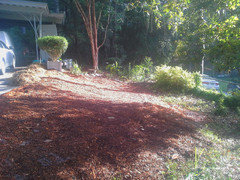
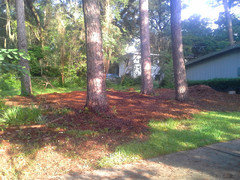
First, I want to discourage people from using black plastic ever anywhere. On my property we dug up MANY square feet of it left by previous residents. How did we find it? I was trying to remove a two foot deep layer of asiatic jasmine and that is what was underneath. Under the plastic was sterile hard pan clay with running bamboo rhizomes crisscrossing!! No worms. No fungus. Just golden bamboo rhizomes. Why do this when one can amend the soil? In well mulched soil, bermuda grass can be pulled as easily as oxalis in my experience.
Since my last response on this thread, my bermuda grass lawns had much better conditions this year to thrive, so I planned to deal with it. However, in one spot, the area where I had a pile of wood chips last year, it did not come back, and digging showed no rhizome life. There was not even any cardboard or other barrier under that pile, just about a foot and a half deep of chips for a few months.
In the first photo to the left you can see what looks like piles of straw on the driveway. That's all bermuda grass that I pulled. I got tired of that and waiting for rain to soften the dirt. I called a connection to get some truckloads of chips. What you see in these photos are partially spread 3 full Asplundh truckloads. I am taking care not to have a thick layer (no deeper than my thumb) over my tree drip lines, but otherwise getting about ten inches deep on the grass. I'll take a couple more truckloads! I am spreading it myself with a lightweight stiff rake and sometimes a manure fork.
If you like my work here, please consider visiting my youtube channel and giving some vids a few clicks. pontyrogof's youtube channel
sallylebaron7
8 years agoI really appreciate the input of those who were successful. The cowpeas sounded good , also the st. Augustine, and the foot and a 1/2 " of wood chips. that white vinegar with lemon extract sounded good too but had questions of the "lemon extract" hmm wonder if that was the kitchen one for flavoring cookies ect. It must be . I have too many areas to dig by hand.
harleybabe5772
6 years agolast modified: 6 years agoWow I am having a problem this year. In the past in my one vegetable garden I just dug it up with a pitch fork and pulled out all of the roots I could find all summer long. Then in the fall and winter it would go dormant, next spring I would dig it out where it grew again and it was a summer long thing. Finally I thought it was licked and added on a larger garden with raised beds (because of gophers) Well the grass appeared around the raised beds. So I dug out what I could then placed down cardboard on the damp soil, soaked the cardboard and covered it with straw. to try and smother it out. The cardboard held up for 2 years and the grass that migrated out the side of the cardboard was easily contained. This year we had more rain here in NorCal (Sacramento area) and the cardboard was completely disintegrated so I decided to do without it. I have spent the last week digging it out with a pitchfork after trying organic products Avenge and Burnout with spotty results in killing any stray weeds outside of the beds. In 2 days I will go back to my previous method used in the other garden and keep digging it out, as it is migrating back into that garden. I hate the stuff too, it is in our lawn as well. I was hoping to find a tried and true way to get rid of it but I can see it will take years. Deep mulch didn't work for me and I used cardboard, compost and deep mulch and left one area like that for 2 years.
jolj
6 years agoharley, this is what I do to kill the 3 hard to kill grasses:
jolj(7b/8a)henry, I am going to try solarization on my bahia grass.
90% of the things on this thread will not eradicate bahia grass. This includes round up, which kills the tops, but not the deep roots. Round up will not kill nut sage/ nut grass or common dew berry vines.
So I will try this on the bahia. I have heard that the
solarization may kill the soil food web, when it kills the weeds. I am planning to sheet compost the beds after I kill the grass/ weeds. I have been told that tilling kills the soil food web. Not sure who is right or if it matters, I give vegetables away every season including the winter.
I grow more then I can use, then I must be doing something right.[Like[(https://www.houzz.com/discussions/organic-way-to-get-rid-of-bermuda-grass-dsvw-vd~1521679) I did this in 2011 & it worked great.
cymraes
6 years agoHas anyone tried solarization to get rid of Bermuda? That's what I'm am going to try. Lay down clear plastic, seal the edges and let the sun do the rest. Not sure it will work, but I've tried everything else. Except chemicals.....not going to use roundup where I plant my vegetables.
jolj
6 years agoIt worked for me 2011 , I did not wet the soil first.
I just laid out the clear plastic & put post on the edges to hold it down.
I am going to do another plot this year.
Eileen Keyes
6 years agoHi everyone, I'm new to this. Glad to be included. I've found cardboard to be quite effective against Bermuda grass. Layers and layers. You can cover it with mulch but don't have to. just make sure it is weighted down. All living plants MUST have sunlight to do photosynthesis, to live. Starve them of light long enough, and they have to die. I live near a recycling collection station, so I pull out large sheets, like boxes refrigerators come in. Cover the intersections where the edges meet with solid layers. Also, at my previous house, I did get rid of it entirely this other way: cut it down, dug out as much as reasonable, then roto-tilled it lightly, which broke the stolons into long loosened pieces. Then I used a pitchfork and bow rake to pull as much of them out as possible. Roto tilled again deeper and did the same thing. This loosened everything up, and made it easy to pull out the stolons which were still there when they sprouted. I kept digging every time I saw green, and after a couple months I had it under control, then just had to be watchful for any sprouting from seed.
By the way, I see there is much controversy over Roundup. I don't ever use it unless it is, like... an emergency, but there are times. The Bermuda grass had massively invaded the crack between the long cement patio and the concrete block wall across the front of my older house, and began growing up INSIDE my house, from behind the baseboards. Vinegar didn't help. I had to do SOMETHING!
Eileen Keyes
6 years agoOh, heavens no!!! Lol... on the outside where it was growing all along that crack. Killed it from the outside. I stay as far as I can from Roundup. Therer were just a few tendrils growing up inside.
cymraes
6 years agoYou've obviously never dealt with bermuda grass! The roots can be 3 - 4 feet long and there is no way to pull it. In fact trying to pull it only makes the situation worse.
Eileen Keyes
6 years agoAll the roots were under concrete. The grass itself began growing out of that crack, along a four foot stretch where the house wall meets the outside patio. Then the roots came under and through cracks to inside, behind the baseboards. House wrecker!!! First time I used Roundup. Ever.
kathincolorado
5 years agoI recently read somewhere to apply BOILING WATER to kill off BGrass. I have a small patch to clear (actually would Love to kill more, but this area is my test spot) I think I'll first loosen up the dirt a bit& may take a few batches of water, but worth a try! The water may cool down to quickly as it seeps into the soil, I fear. *NOTE-This is how how eradicate FIRE ANTS..works great!
Theodore B.
4 years agoVigorous weeding, immediately followed by a very dense planting of winter rye effectly killed BG for me
Winter rye has properties which stunt/kill many plants.
I used a hoe, raked out the patch, picked out as many pieces of the BG as I could, then densely, and I mean densely, seeded the winter rye. I let the rye grow right up till it was about to go to seed, then I used a sickle to cut it and lightly incorporate it into the soil.
This worked for me. Maybe it'll work for you
stanleyavenue
3 years agoHi I'I've become an authority on this! I went to war with the Bermuda grass last year. I tried several things in different patches of my large lawn and hands down Ornamec is the best.
Mix it "mark it blue" so you can see where you've sprayed and repeat the application as per the directions.
stanleyavenue
3 years agoNothing organic works and roundup is not as effective as ornamec. 16 months of experience backs this up. My neighbors thought I was obsessed....I was. But the Bermuda grass is gone.
HU-669481889
3 years agoI live in Phx, Az. My backyard was weedless and bare dirt for my dogs. One section of the yard had low spot's where water would stand if we got rain. I hired a contractor in the neighbor said he had some free fill dirt if I was interested. So he delivered it and had it spread out while I was not home. I did not know this fill dirt had multi rocks and bermuda grass mixed in it until I got home and saw it. I pulled out some of the large pieces of this bermuda grass but there is so many small little pieces of it.
My concern is that this bermuda grass which I have never had will start to grow and invade my yard.
What should I do?dchall_san_antonio
3 years agoHU-669, you really should open a new topic. This one has an exhausting 160 replies, already. You're asking people to read all those and then we get to your question. Please start a new one.
jolj
3 years agoNo one asking anyone to read ALL those replies. If you do not want to know what we know, skip our replies. On a new thread or topic, we will come over & reply & you will be back where you are now.
jolj(7b/8a)
henry, I am going to try solarization on my bahia grass.
90% of the things on this thread will not eradicate bahia grass. This includes round up, which kills the tops, but not the deep roots. Round up will not kill nut sage/ nut grass or common dew berry vines.
So I will try this on the bahia. I have heard that the
solarization may kill the soil food web, when it kills the weeds. I am planning to sheet compost the beds after I kill the grass/ weeds. I have been told that tilling kills the soil food web. Not sure who is right or if it matters, I give vegetables away every season including the winter.
I grow more then I can use, then I must be doing something right.[Like[(https://www.houzz.com/discussions/organic-way-to-get-rid-of-bermuda-grass-dsvw-vd~1521679) I did this in 2011 & it worked great.

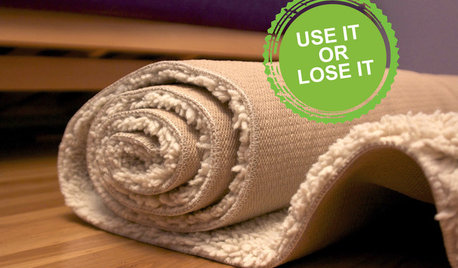
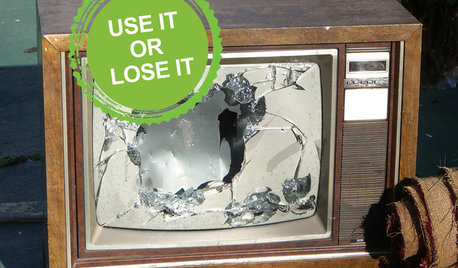
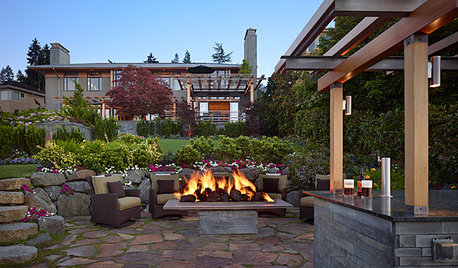



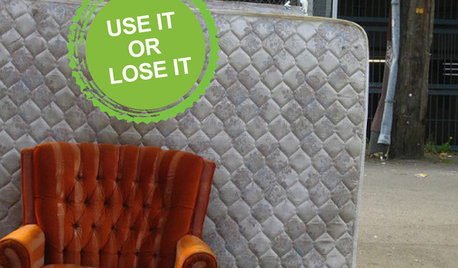










Kimmsr